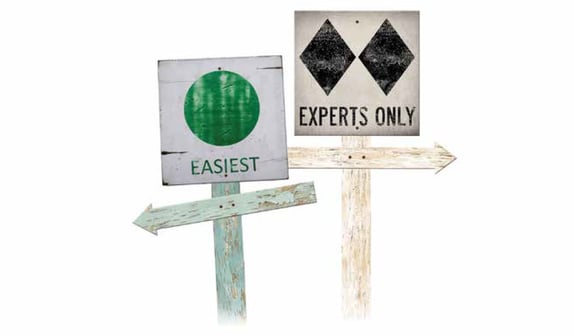
When I met my husband, an avid skier, I realized I better learn to ski and like it, if the relationship was to work. Fortunately, I did. Skiing became a fun family activity and a great way to enjoy being in nature during winter. Yet, between my relative clumsiness, lack of confidence and the recognition that I’m aging, I know my skills will never compare to my husband’s. While trying to keep up with him as I negotiated my way down a black diamond run in fresh powder this past winter, my focus was solely on trying not to fall. In that moment, I became aware that my fear was holding me back from enjoying the exhilaration of gliding through the snow and the breathtaking beauty that surrounded me.
I was playing not to lose
One can argue that the risk of falling was significant, as were the consequences. But this idea of playing not to lose is something that each of us regularly encounters in our professional and personal lives. When we are upset by something but avoid having an honest conversation about it for fear of creating an uncomfortable confrontation, we are playing not to lose. When we allow our fears or lack of confidence to prevent us from volunteering to work on a project that interests us or taking on a leadership role, we are playing not to lose. When we want to join a group but hold back, afraid we might not be welcome, we are playing not to lose. Our reward for this behavior is a lot of regret, resentment and a life that feels like it’s a black and white version of the full color life we dreamed we would have.
How much more colorful could our lives be if, instead, we played to win?
Sure, we might stumble through that uncomfortable conversation or suffer some embarrassment if we don’t perform perfectly in a new role. Or we could feel humiliated if our overture to join a group is rebuffed. But as we leave our comfort zone, we might discover we are more resilient than we give ourselves credit for. We might learn some important skills as we honestly discuss a difficult subject or take on new roles. We can begin to see ourselves in a new light—as more courageous people who “do things” rather than sit on the sidelines. And if our attempt doesn’t work out, we can stop spending time hoping that it will, and find a new opportunity that might be even more interesting or fit us better.
Consider where in your life you’re laying not to lose. What is it you’re afraid of losing? Is that really more important than the excitement or fulfillment you might gain if you won? What would you do differently if, instead, you played to win?


